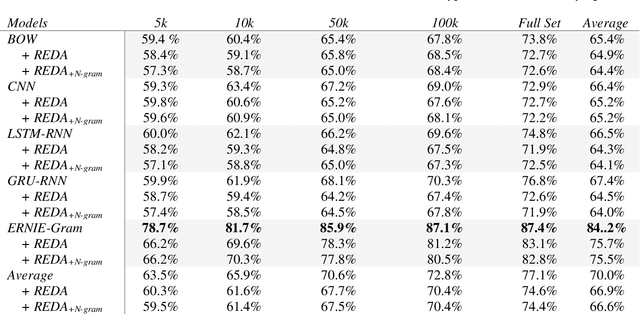Linguistic Knowledge in Data Augmentation for Natural Language Processing: An Example on Chinese Question Matching
Paper and Code
Dec 15, 2021



To investigate the role of linguistic knowledge in data augmentation (DA) for Natural Language Processing (NLP), particularly, whether more linguistic knowledge leads to a better DA approach, we designed two adapted DA programs and applied them to LCQMC (a Large-scale Chinese Question Matching Corpus) for a binary Chinese question matching classification task. The two DA programs produce augmented texts by five simple text editing operations (or DA techniques), largely irrespective of language generation rules, but one is enhanced with a pre-trained n-gram language model to fuse it with prior linguistic knowledge. We then trained four neural network models (BOW, CNN, LSTM-RNN, and GRU-RNN) and a pre-trained model (ERNIE-Gram) on the LCQMC train sets of varying size as well as the related augmented train sets produced by the two DA programs. The test set performances of the five classification models show that adding probabilistic linguistic knowledge as constrains does not make the base DA program better, since there are no significant performance differences between the models trained on the two types of augmented train sets, both when the five DA techniques are applied together or separately. Moreover, due to the inability of the five DA techniques to make strictly paraphrastic augmented texts, the results indicate the need of sufficient amounts of training examples for the classification models trained on them to mediate the negative impact of false matching augmented text pairs and improve performances, a limitation of random text editing perturbations used a DA approach.
 Add to Chrome
Add to Chrome Add to Firefox
Add to Firefox Add to Edge
Add to Edge